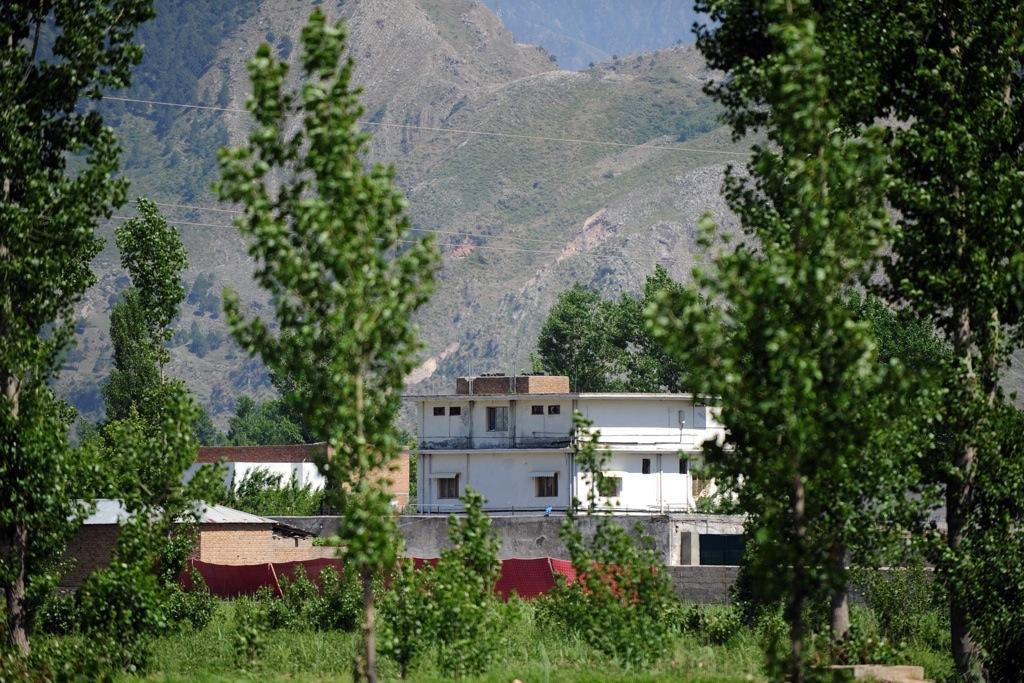Pakistan cautious about bin Laden’s death
The hideout of Al Qaeda leader Osama bin Laden is pictured after his killing by U.S. Special Forces in a ground operation in Abbottabad on May 2, 2011. Pakistan said that the killing of Osama bin Laden in a U.S. operation was a “major setback” for terrorist organizations and a “major victory” in the country’s fight against militancy.
ISLAMABAD, Pakistan – The killing of Al Qaeda leader Osama bin Laden on Sunday has been received with cheers in the United States, but in Pakistan it has raised more questions than answers about the exact role of Pakistani authorities in the U.S.-led operation and the impact of bin Laden’s death on the raging insurgency here.
U.S. President Barack Obama said late Sunday that earlier that day American forces conducted a raid on a house in the northern Pakistani city of Abbottabad and killed the architect of the Sept. 11, 2001, attacks in a firefight. Obama released few details about the operation but said that Americans had taken custody of bin Laden’s body. He added that no American was injured in the operation.
The development constitutes a major victory for the Obama administration, but its significance for Pakistan’s government is less clear. While leaders the world over were quick to express satisfaction at the news, Pakistani authorities kept mum for several hours after Obama’s address before issuing a terse statement in which they reiterated their resolve to fight terrorism but suggested they played no role in the covert operation.
That is not likely to be the case, said many observers of the Pakistani military. Pakistan’s Inter-Services Intelligence, or ISI, is widely believed to have precise knowledge of the whereabouts of the various insurgent groups operating in the country. That it would ignore that the world’s most wanted man had taken refuge in a Pakistani resort just miles from a military academy is inconceivable, said defense analyst Ayesha Siddiqa. She said that there must have been “some cooperation” between American and Pakistani intelligence services in the operation.
“What it means to Pakistan to me is worrying. Look at where he was caught,” Siddiqa said. “That itself would raise questions as to what was Pakistan doing. Why were they so quiet?”
The ISI has long been accused by Americans of harboring ties with militants to the point that it was labeled a terrorist organization as recently as 2007 by U.S. authorities, according to documents released by Wikileaks.
Those accusations were unfounded and bin Laden’s killing was the result of a “great contribution by Pakistani forces” for which the Americans were taking credit, said Rasul Baksh Rais, a professor of political science at Lahore University.
“I think an apology is due to the ISI,” he said.
An official with the ISI declined to comment beyond the statement issued by the Foreign Ministry.
Senior officials in the Obama administration said the operation conducted Sunday was the result of years of careful intelligence work. They said Pakistani authorities assisted in pursuing the intelligence lead but were informed of the raid only after it had taken place.
“We shared our intelligence on this bin Laden compound with no other country, including Pakistan,” one senior U.S. official said. “That was for one reason and one reason alone: We believed it was essential to the security of the operation and our personnel.”
The operation, which took place in a large mansion about 60 miles from the capital Islamabad, included two helicopters, a “small U.S. team” and lasted less than 40 minutes, officials said. Besides bin Laden, three men and one woman were killed in the raid, they said.
One U.S. official said bin Laden’s body was “handled in accordance with Islamic practice and tradition.”
In its statement, Pakistan’s Foreign Ministry did not mention any involvement in Sunday’s operation but said that it had played a major role in fighting terrorism on its soil.
“We have had extremely effective intelligence-sharing arrangements with several intelligence agencies, including that of the US,” the ministry said.
Publicizing these efforts is another issue, however. Two prominent members of Pakistan’s ruling party were killed earlier this year for their comments on Pakistan’s blasphemy laws, and to the extent possible the government has tried to avoid fueling anger among the country’s religious extremists.
“Backlash will be there if Pakistan is found to have cooperated (in the U.S.-led operation),” said former ISI chief Hamid Gul on a Pakistani news channel.
Imtiaz Gul, an Islamabad-based political analyst, said that the raid wouldn’t have happened without ISI collaboration and that the success of the operation is sure to reduce tensions between American and Pakistani intelligence services.
It is unclear what the immediate impact of bin Laden’s death will have on the instability in Pakistan. Al Qaeda is just one of several insurgent groups and not the most active in Pakistan. The Pakistani Taliban, for instance, have claimed responsibility for most of the bombings that have taken place here over the past four years.
“I don’t think it will have a major impact on the insurgency in the country,” Imtiaz Gul said.
Every day, reporters and producers at The World are hard at work bringing you human-centered news from across the globe. But we can’t do it without you. We need your support to ensure we can continue this work for another year.
Make a gift today, and you’ll help us unlock a matching gift of $67,000!
